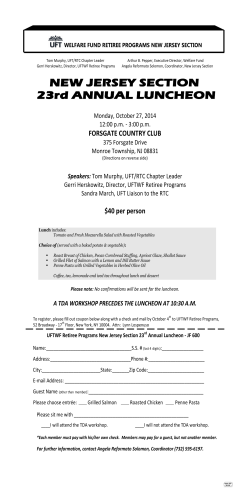
Document 358336
Para leer la versión en español, ver la parte trasera Welcome TIPS FOR A SUCCESSFUL An Invitation from the UFT President Dear Family Member, The United Federation of Teachers, the collective voice of your child’s teachers, has prepared this guide to help you get the most out of your parent-teacher experiences. The connection between teachers and parents is critical in helping students succeed, and we encourage you to take advantage of the many opportunities that will be provided this year to engage with your child’s teacher. Working together, educators and parents can achieve the best results. Parent-teacher conferences provide an opportunity for you to ask any questions you may have about what goes on in the classroom, the learning expectations for the year ahead and your child’s educational needs. It is the place to discuss any concerns you may have and learn how you can support and reinforce the learning at home. We share a common goal — to see your child thrive in the classroom. We look forward to seeing you throughout the school year! Sincerely, Michael Mulgrew Tips: Talking With Your Child Instead of asking questions that lead to one-word answers—like “How was school today?” (“OK”), or “What did you learn today?” (“Nothing”) — ask specific questions that can start a conversation, such as: • What was the most interesting thing you did (or learned) in school today? • What was the best/worst part of your day? • How did the test go? • Whom did you have lunch with today? • Tell me about tonight’s homework assignment. To prepare for your parent-teacher conference, ask your child specific questions. For example: • What do you enjoy most about school? • Do you find the work too easy, too hard or about right? Do you have trouble keeping up with the work? • Are there times when you do not understand what is being taught? If so, what do you do about it? • Can you see and hear your teacher from your regular seat? (Perhaps your child needs glasses, which may improve reading, learning and even behavior.) • How do you get along with the other children? Do you ever have fights with other students? • Probe for details if anything concerns you. During your visit, what you can expect You will meet individually with your child’s teacher(s) to discuss your child’s progress with schoolwork and social development. You can discuss concerns you have and get the help of caring educators who want your child to succeed. You will find out: •what your child is expected to learn •how she or he is meeting those expectations •what special help or services the school offers to support your child’s learning •how you can encourage your child’s learning at home •how you and the teacher can work together to help your child. How you can prepare for the parent-teacher conference Teachers want to hear your ideas and questions. Your conference to an exciting year SCHOOL YEAR Parent-Teacher Conference Schedule Grade Level Elementary Fall 2014 Spring 2015 Evening Date Afternoon Date Evening Date Afternoon Date Wed., Nov. 19 Thurs., Nov. 13 Thurs., Mar. 19 Wed., Mar. 18 Wed., May 13 Intermediate and Wed., Nov. 12 Thurs., Nov. 20 Junior High Schools High Schools Wed., Mar. 11 Thurs., Mar. 12 Wed., May 6 Wed., Nov. 5 Fri., Nov. 7 Thurs., Mar. 26 Fri., Mar. 27 Thurs., May 7 District 75 schools programs Mon., Nov. 17 Tues., Nov. 18 Mon, Mar. 2 Tues., Mar. 3 Note: Be sure to check with your child’s school about the precise dates and times. All schools will meet on the afternoons in this schedule. However, they may choose different dates and times for evening conferences. will be more productive if you prepare before you go. Here are a few things you can do: •ask your child how he or she feels about classes, assignments and school (see “Talking with your child”) •together with your child, prepare a short list of questions or concerns that you can raise with the teacher •make arrangements in advance so that you can be on time for your meeting; if possible, do not bring along young children, because they can be distracting Think about what you can tell teachers that will help them understand your child better, such as your child’s: •favorite or best subjects •special interests, skills, talents and hobbies •study habits •medical conditions, family situation or any problems that can affect learning, attendance or behavior •any resistance to going to school. want to ask the teacher(s): •What topics will be taught this year? What are some important skills that my child will have to master? •Does my child participate in class activities and discussions? Does she or he do the homework assignments? •How much time do you expect to be spent on homework? Do you assign homework every day? •Are there any special projects or long-term reading assignments that my child will have to complete this year? •What are the standardized tests in my child’s grade or subject? When are they given? How will I be informed of the results? Continued next page How Is Your Child Doing? Teachers will give you important information about your child’s academic progress. Make note of how the teacher describes your child’s strengths as well as areas that need improvement, so you can discuss these comments later with your child. Ask the teacher what your child is expected to learn and what the learning goals are for your child’s grade and subject. Then talk with your child about the importance of meeting those standards. Here are some questions that you might UNITED FEDERATION OF TEACHERS • A UNION OF PROFESSIONALS • www.uft.org Tips: Special education and the Individualized Education Program (IEP) If your child is receiving special education services, his or her school program is based on an individualized education program (IEP), which was agreed upon by you, your child’s teachers and service providers, assessment professionals and a representative of the school administration. Your child’s IEP should reflect the services and supports your child needs to progress in the curriculum and achieve proficiency on assessments. If your child is not receiving the services he or she is entitled to, you should let the UFT know (212701-9499); the ARISE Coalition is also a resource to which you can turn (212-822-9523). There are three things you can do to help ensure your child gets the support and attention she or he needs: • Make sure you have a copy of the current IEP. • Ask your child’s teacher if she or he has a copy of the IEP (the law requires that she or he does). • Together, make sure your child is getting all the support specified in the IEP. If your child is not getting the proper services or support, talk to the principal, or, if your school has one, the special education supervisor. Probe for details if anything concerns you. •How will you keep me informed if he or she is falling behind? •Is tutoring or other extra help available at school? •What determines the grade my child will get in this class or subject? •If my child is absent, what is the best way to find out about the missed classwork or homework? •How can I help at home? •How can I get in touch with you? Behavior Counts Students learn best in an orderly atmosphere. A few misbehaving students can disrupt learning for a whole class. If your child has expressed any concerns about order in the school or about disruptive or bullying children, bring this to the attention of the teacher or the administration (see “Your Principal and School Leadership Team,” page 3). The School Environment and Classroom Facilities School is a home away from home, so when visiting the school, pay attention to its atmosphere. •Is it friendly and welcoming? Are there dis- plays and decorations in classrooms and halls? (They give clues about what students are learning.) •Is the school clean both inside and out? Is it well maintained and in good repair? •Does the school have facilities for special activities, such as a library, science labs, computers, a music room, an art studio and other specialized classrooms? If you are not pleased with what you see, speak to the principal, parent coordinator and parent association officers about your concerns. •Support services from a guidance counselor, nurse or other health professional, speech or language teacher, social worker, psychologist or other specialist. •Extra help for students who need it outside of regular class time for either remediation or enrichment. •Programs for children who are learning English. There are two kinds of programs to help them learn English: Bilingual programs, where lessons are taught in children’s native languages while they are learning English, or English as a Second Language (ESL) programs, which are taught in Tailoring support for your child English and provide special help in learning the language. •Special education programs, both full and part time, for children with learning or behavioral disabilities. If you believe that your child has special needs or disabilities that are not being addressed, ask the teacher how to get an evaluation by the Department of Education. •After-school programs that may be recreational or academic. Many schools also have clubs, teams and other extracurricular activities after regular school hours. Don’t hesitate to ask about what Continued next page What’s offered in the typical class may not meet the needs of every child. Some can take on more advanced work. Others may have difficulty learning certain subjects, have trouble concentrating or sitting still, or need more time for taking tests and completing projects. Talk to the teacher about your child’s special needs. Perhaps you need an appointment with a guidance counselor or some other school specialist who can advise you. New York City public schools offer many programs and services. If you think your child needs special support, ask the teacher what is available. Options may include: •Enrichment classes for gifted and talented youngsters. 2 Tips: Your Principal and School Leadership Team is available in your school if you or the teacher believes that your child needs a special service or particular attention. Back home after your visit Talk with your child about the teacher’s evaluation of his or her strengths and weaknesses. You can make plans to work together on the areas that need improvement. Here are some things you can do routinely: •Talk about school. Ask about lessons, events and happenings at school. Look at the work your child brings home and encourage her or him to talk about what she or he has learned. •Make sure your child goes to school every day and arrives on time. Laying out clothes, books and everything he or she needs for school the next day in the evening can help. •Shape good homework habits. Having a regular time and place for doing homework sets a helpful routine. A quiet place with good lighting is ideal. Have a “no TV, no iPod, no video game” rule during homework time, because they are distractions that interfere with learning. •Encourage your child to read. Help your child find books and magazines that she or he enjoys reading apart from schoolwork. Read together with your child. Let your child see how much you enjoy reading. Visit your local neighborhood library with your child and get a library card for him or her. •Limit — and monitor — TV watching and computer use. Make sure that TV, movie, game and Internet content is appropriate to your child’s age. Keep in Touch Your child’s success, now and in the future, depends on a strong partnership between your home and the school. Become involved and stay involved. •Visit the school again. Make an appointment. You’re always welcome. •Keep in touch with the teachers and respond promptly if they contact you. •Watch for notices of school meetings and activities. •Consider becoming involved in your school leadership team, or its committees, and with your school’s parent association (see “Your Principal and School Leadership Team”). Remember, the schools your children go to are also your schools. The family is fundamental to education. •How do you think my child feels about school? What can we do to make my child feel good about coming to class? •How is my child doing in reading and math? Does my child need any special help? Is my child ready for more advanced instruction? •Does the school offer any enrichment programs to develop talents in music, art or other subjects? •Does my child complete all his/her work on time? If not, what seems to be the problem? •What can I do at home to promote good study habits? •What procedures are in place to keep my child safe? Continued next page Principals now have great discretion about how their schools are run and structured. This additional responsibility comes with expanded authority to do something about concerns that you may have. The principal works in conjunction with a school leadership team, whose central purpose is to develop a shared educational vision for the school. This team, which has administration, teacher, parent and student representation, has important responsibilities, including: • developing the school’s comprehensive educational plan • aligning the school budget to that plan • communicating the plan’s goals to the entire school community. Each school has a parent association and a parent coordinator. They can tell you about the school, how you can join or support the school leadership team and other ways that you can become involved. They also may help you solve certain problems. If they can’t, talk with the district family advocate at your community school district office. For more information, see your parent coordinator, school website or the Department of Education Parents and Families web page at at http://schools.nyc.gov/ParentsFamiles/. Issues that you might bring to the principal’s attention There are certain schoolwide issues that you may want to talk to your principal or school leadership team about. For example... ...if your child says that the class is crowded or that the teacher doesn’t have enough time to give every child individual attention. ...if your child does not have enough books or supplies for all subjects and activities. ...if your child does not feel safe in school because of bullying or any other circumstance. Special Questions to Ask About Your Child Here are some questions about a child of any age: •How well does my child work alone? With others? UNITED FEDERATION OF TEACHERS • A UNION OF PROFESSIONALS • www.uft.org ... About your junior high, middle or intermediate school child •This is the first time my child has different teachers for different subjects. Do those teachers work together and share information about my child? •Does the school have advisory periods? •Does the school offer Regents-level science and math classes? •Do students have the opportunity to see guidance counselors regularly? •Is the school divided into “houses” according to themes or interests? If so, what are they and how are students placed in them? •How will the school staff help my youngster choose a high school? •Does this school offer any special preparation for the entrance test for the specialized high schools? ... About your high school child •How many credits are needed for graduation? •Are there college counselors available? •What academic specialties does the school offer? •Are there any career and technical subjects taught? •Are there any Advanced Placement (AP) courses offered? In what subjects? •Does the school have credit recovery programs for subjects that my child has failed? •What afterschool activities are offered for enrichment, intervention or support? •Does the school offer or recommend SAT prep for college admission? •Are there student clubs my child can join? •What type of music, art and athletic programs are available? UFT Parent Support Here are the best ways to reach our community and parent liaisons: The United Federation of Teachers (UFT) parent and community outreach is lead by Director of Community and Parent Outreach Anthony Harmon, who works out of the union’s headquarters in Manhattan. In addition, the UFT offers support to parents in every borough. Workshops, networking and informational meetings are scheduled for groups and one-on-one. To find out what’s available and to ask other questions, contact the UFT borough office in the borough where you live or where your child attends school. Bronx Nicholas Cruz Bronx UFT Office 2500 Halsey Street Bronx, NY 10461 1-718-862-6074 [email protected] Tips: The UFT’s Dial-A-Teacher Offers Homework Help Brooklyn Betty Zohar Brooklyn UFT Office 335 Adams Street, 25th Floor Brooklyn, NY 11201 1-718-722-6937 or 1-917-796-8950 [email protected] Manhattan Francine Streich Manhattan UFT Office 52 Broadway, 10th Floor New York, NY 10004 1-212-701-9464 [email protected] Queens Rose Walker-Yates Queens UFT Office 97-77 Queens Blvd., 5th Floor Rego Park, NY 11374 1-718-275-4400 [email protected] The United Federation of Teacher (UFT) sponsors a homework help program for elementary and middle school students called DialA-Teacher. Classroom teachers assist with homework questions at 1-212-777-3380, Monday through Thursday, from 4 to 7 p.m. during the school year. They can also assist with parents’ questions and give advice on how you can help your child at home. The staff speaks 8 languages: Bengali, Chinese (Mandarin, Cantonese and Fukanese), English, French, Haitian-Creole, Russian, Slovak and Spanish. Staten Island Joan McKeever-Thomas Staten Island UFT Office 4456 Amboy Road Staten Island, NY 10312 1-718-605-1400 [email protected] Call on Monday, Tuesday, Wednesday or Thursday 4:00 - 7:00 p.m. 1.212.777.3380 4
© Copyright 2026











